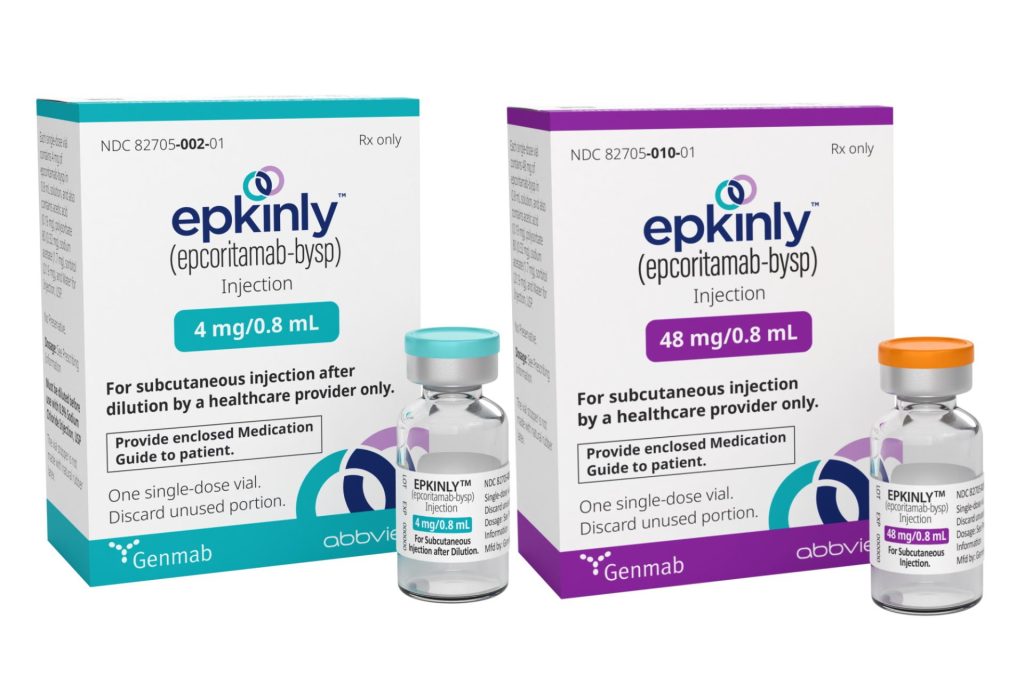July 2023: The Food and Drug Administration gave accelerated approval to epcoritamab-bysp (Epkinly, Genmab US, Inc.) for relapsed or refractory diffuse large B-cell lymphoma (DLBCL) not otherwise specified, including DLBCL that comes from indolent lymphoma, and high-grade B-cell lymphoma after two or more lines of systemic therapy.
Epcoritamab-bysp, a bispecific CD20-directed CD3 T-cell engager, was tested in EPCORE NHL-1 (NCT03625037), an open-label, multi-cohort, multicenter, single-arm study with patients with relapsed or refractory B-cell lymphoma. The efficacy population was made up of 148 patients with relapsed or refractory DLBCL, not otherwise specified, including DLBCL from indolent lymphoma and high-grade B-cell lymphoma, after two or more lines of systemic therapy, including at least one anti-CD20 monoclonal antibody-containing therapy.
An Independent Review Committee used the Lugano 2014 criteria to figure out the overall response rate (ORR), which was the key measure of effectiveness. The ORR was 61% (95% CI: 53–69), and 38% of patients had a complete reaction. With a median follow-up of 9.8 months for responders, the projected median duration of response (DOR) was 15.6 months (95%CI: 9.7, not reached).
The prescription information has a Boxed Warning about cytokine release syndrome (CRS), which can be serious or even kill you, and immune effector cell-associated neurotoxicity syndrome (ICANS), which can also be serious or kill you. Among the warnings and measures, infections and cytopenias are mentioned. 51% of the 157 people with relapsed or refractory large B-cell lymphoma who took the suggested dose of epcoritamab-bysp had CRS, 6% had ICANS, and 15% had serious infections. 37% of people with CRS had Grade 1, 17% had Grade 2, and 2.5% had Grade 3. 4.5% of ICANS cases were Grade 1, 1.3% were Grade 2, and 0.6% were Grade 5.
Epcoritamab-bysp should only be given by a trained medical worker with the right medical support to deal with serious reactions like CRS and ICANS. Because of the chance of CRS and ICANS, people who take 48 mg on Day 15 of Cycle 1 should stay in the hospital for 24 hours.
The side effects that happened most often (about 20%) were CRS, tiredness, pain in the muscles and joints, reactions at the injection site, fever, abdominal pain, nausea, and diarrhoea. The most common Grade 3 to 4 lab abnormalities (10%) were a lower number of lymphocytes, neutrophils, white blood cells, haemoglobin, and platelets.
The suggested treatment plan is to give epcoritamab-bysp subcutaneously every 28 days until the disease gets worse or the side effects are too bad. In Cycle 1, the suggested dose is 0.16 mg on Day 1, 0.80 mg on Day 8, and 48 mg on Days 15 and 22. This is followed by a fixed dose of 48 mg every week for Cycles 2 through 3, every other week for Cycles 4 through 9, and then every four weeks on Day 1 of subsequent cycles.
View full prescribing information for Epkinly.


